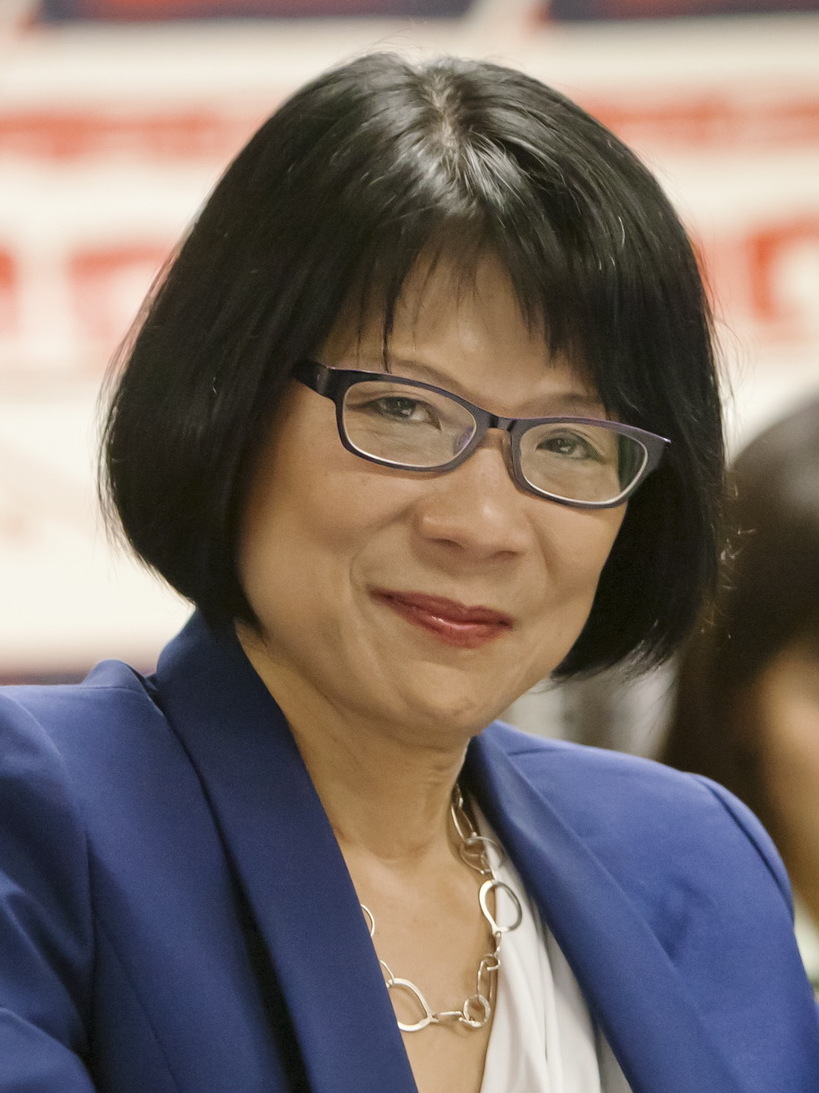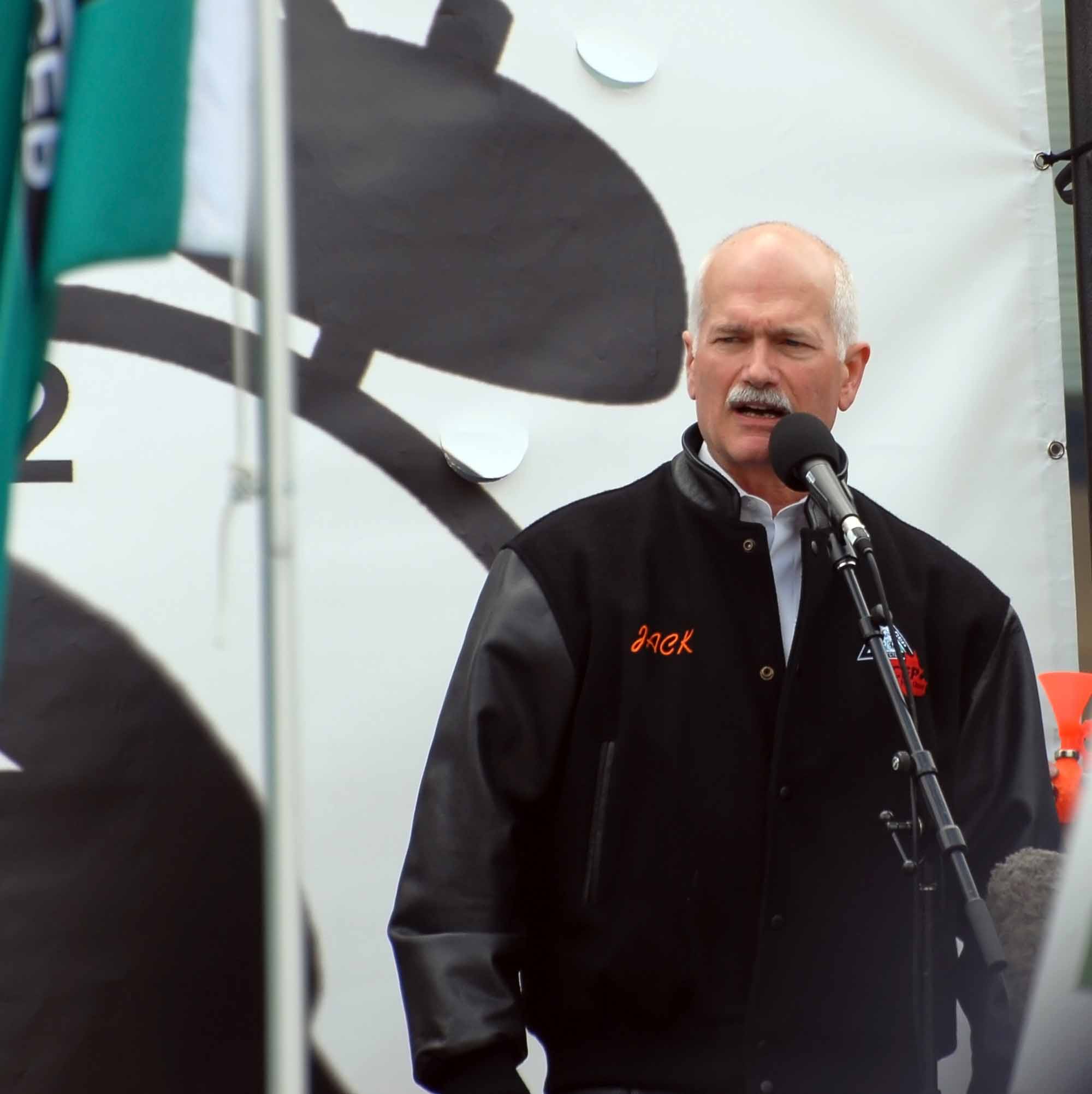Olivia Chow, mayor of Toronto 2023–present, politician, organizer, artist (born 24 March 1957 in Hong Kong). Olivia Chow began her career in Toronto municipal politics as a school trustee in the 1980s. She went on to serve as a city councillor from 1991 until 2005. In 2006, she entered federal politics as a Member of Parliament. She took a prominent role in the NDP caucus alongside her husband, NDP leader Jack Layton. In 2023, Chow became the first racialized person elected mayor of Toronto.

Early Life in Hong Kong
Olivia Chow’s mother, Ho Sze Chow, grew up in Guangdong province during the Japanese occupation of China during the Second World War. After joining the Chinese national army, she married a soldier, Chow Nam Shang, and had a son, Yu Ching Chow, later known as Andre. Soon after, Shang was killed by Communist forces in the Chinese Revolution.
Ho Sze Chow fled with her son to Hong Kong, where she met and married Wai Sun Chow. Along with Andre and their young daughter, Olivia, the couple settled in the middle-class neighbourhood of Happy Valley. Ho Sze Chow worked as an elementary school teacher while her husband, a part-time Western opera performer, became a school superintendent. By the late 1960s, drought and anti-British protests were destabilizing life in Hong Kong. In 1970, the Chow family decided to emigrate.
Early Years in Toronto
In 1970, at age 13, Olivia Chow and her family arrived in Toronto. At first, they settled in a rooming house in the Annex neighbourhood. But soon after, they moved to an apartment in St. James Town. Compared to their life in Hong Kong, both of Chow’s parents experienced a serious socio-economic decline in Toronto. Her mother worked as a seamstress in a sweatshop (where Chow also worked briefly) and later in the laundry room of a hotel. Her father struggled to find work as a teacher despite being highly qualified. He eventually took work driving taxis and delivering Chinese food.
In her adolescence, Chow attended Jarvis Collegiate Institute and took art classes at Central Technical School. She also worked odd jobs as a cashier and waitress. After graduating, she enrolled at the University of Toronto, where she studied philosophy of religion. At the same time, she took courses in sculpting at the Ontario College of Art (now the Ontario College of Art and Design University).
Political Conscience and Social Justice
A number of experiences in the late 1970s spurred Olivia Chow’s politicization and interest in social justice. In childhood, her home life had been complicated by the erratic behaviour of her father. He would often dote on Olivia yet physically abuse his wife and reject his stepson, Andre. As her father’s mental health declined and his violent behaviour continued, Chow began to view gender-based violence as a pervasive, political problem.
She also volunteered at this time with the Toronto Chinese Baptist Church, with which her family had been closely involved, and Toronto East General Hospital’s crisis centre, where she assisted people suffering from mental health crises and suicidality.
International events also came close to home. Thousands of Vietnamese people were fleeing persecution in their home country. (See Canadian Response to the “Boat People” Refugee Crisis.) Others fled from the violence of the Sino-Vietnamese War of 1979. Chow became involved in the issue of refugee resettlement after attending a demonstration at Grange Park. She eventually worked with Operation Lifeline, an activist network that ultimately succeeded in pushing the Canadian government to accept over 100,000 refugees.
Early Career
In 1980, Olivia Chow was hired as an assistant by Toronto city alderman Dan Heap. He was then running as a federal candidate for the New Democratic Party (NDP). Heap was keen to strengthen ties to his Chinese constituents and had long contributed to the struggle against homelessness. He went on to become immigration policy critic for the NDP. This pushed Chow to familiarize herself with the details of Canadian immigration law — skills that became indispensable in the mid-1980s as growing numbers of people sought refuge in Canada from political violence.
School Trustee (1985–91)
Olivia Chow entered municipal politics in 1985. She ran for school trustee with the Toronto Board of Education (now the Toronto District School Board). After winning the position, she successfully pushed for numerous reforms in the school system. She promoted the de-streaming of academic programs, where the tiers of “advanced,” “general” and “basic” streams often disadvantaged immigrant children. She also promoted the offering of language instruction in Chinese and other languages to help second-generation students maintain strong ties to their family and heritage. In a similar vein, she later successfully pushed for multilingual 911 services.
Chow also began to address the concerns of the queer community after a group of high school boys attacked and killed a gay man in 1985. Along with Tim McCaskell, the editor of the Body Politic newspaper for Canada’s gay community, Chow interviewed gay and lesbian high school students about their experiences of ostracization. They published their findings in April 1986. As a result of their report, the TDE (now TDSB) became the first school board in North America to include discussion of sexual orientation in the curriculum.
City Council (1991–2005)
In 1991, Olivia Chow ran for city council in the Downtown riding. At the same time, Jack Layton, her husband of three years and a councillor since 1982, ran for mayor. She won her seat on council, but Layton lost his race to June Rowlands.
In her 14 years on city council, Chow was a prominent advocate for social justice on a variety of fronts. In 1998, Mayor Mel Lastman appointed Chow as Toronto’s first advocate for children and youth. In this position, she developed a nutrition program to improve the quality of food at Toronto schools. She spearheaded the After-School Recreation Care program, and Toronto First Duty, a child-care model adopted by some provinces. She also helped establish the Toronto Youth Cabinet, which informally represents the interests of young people at City Hall.
Additionally, as chair of the City of Toronto’s Community Services Committee, Chow advocated for the expansion of social housing in the fight against homelessness, improvements to public transit, dental care for impoverished children, subsidized child care, and improved home care for the elderly.

Federal Politics (2006–14)
Olivia Chow entered federal politics in 1997 in an unsuccessful campaign as the NDP candidate for Trinity-Spadina. She narrowly lost again in 2004, although Layton, by then leader of the federal NDP, won his seat in Toronto-Danforth.
With Paul Martin’s Liberals winning a minority government, the NDP propped up the governing Liberals for the first time since the 1970s. Though Chow had no federal position, she worked closely with Layton in the negotiations on the federal budget in May 2005. They significantly boosted funding for affordable housing, post-secondary education, environmental policies and foreign aid.
In January 2006, Chow ran for a third term in Trinity-Spadina and won. In Parliament, she served on the committees for citizenship and immigration. Throughout her time in the House of Commons, she remained an outspoken defender of workers, immigrants and refugee claimants.
Through Chow’s time in Parliament, the NDP held less sway than it had in the Martin period. The 2006 and 2008 elections gave minority governments to Stephen Harper’s Conservatives, and the NDP won fewer seats in Parliament than the Liberals or Bloc Québécois (BQ). The party’s fortunes would change somewhat in 2011. Harper’s Conservatives won a majority government, but the NDP’s sudden gains in Quebec elevated it to the status of official opposition. Celebrations of the NDP’s new-found strength would be brief, however, as Layton’s health rapidly deteriorated following the election. He died of cancer in August 2011.

Return to Politics
Olivia Chow continued to sit as a prominent member of the NDP caucus until March 2014, when she resigned her seat to run for mayor of Toronto. She lost that election, finishing third behind John Tory and Doug Ford. In the 2015 federal election, she attempted to return to Ottawa by running in her old riding (redistricted as Spadina-Fort York). But she lost to Liberal candidate Adam Vaughan.
In 2023, following Tory’s resignation, Chow made another bid for mayor. In her platform, she pledged to have the municipality build 25,000 rent-controlled units, crack down on renovictions, and improve public transit. She took a strong early lead in the polls and held off a late surge from councillor Ana Bailão to win with 37 per cent of the popular vote. Chow became the first racialized person to be elected mayor of Toronto.

 Share on Facebook
Share on Facebook Share on X
Share on X Share by Email
Share by Email Share on Google Classroom
Share on Google Classroom






